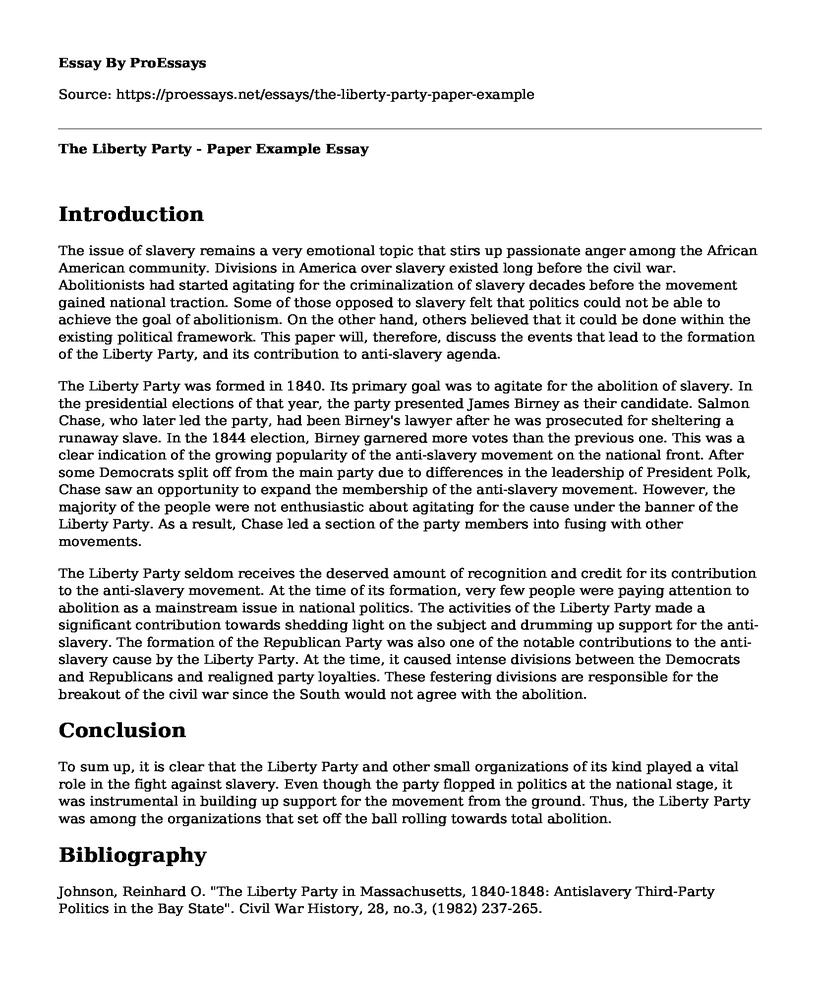Introduction
The issue of slavery remains a very emotional topic that stirs up passionate anger among the African American community. Divisions in America over slavery existed long before the civil war. Abolitionists had started agitating for the criminalization of slavery decades before the movement gained national traction. Some of those opposed to slavery felt that politics could not be able to achieve the goal of abolitionism. On the other hand, others believed that it could be done within the existing political framework. This paper will, therefore, discuss the events that lead to the formation of the Liberty Party, and its contribution to anti-slavery agenda.
The Liberty Party was formed in 1840. Its primary goal was to agitate for the abolition of slavery. In the presidential elections of that year, the party presented James Birney as their candidate. Salmon Chase, who later led the party, had been Birney's lawyer after he was prosecuted for sheltering a runaway slave. In the 1844 election, Birney garnered more votes than the previous one. This was a clear indication of the growing popularity of the anti-slavery movement on the national front. After some Democrats split off from the main party due to differences in the leadership of President Polk, Chase saw an opportunity to expand the membership of the anti-slavery movement. However, the majority of the people were not enthusiastic about agitating for the cause under the banner of the Liberty Party. As a result, Chase led a section of the party members into fusing with other movements.
The Liberty Party seldom receives the deserved amount of recognition and credit for its contribution to the anti-slavery movement. At the time of its formation, very few people were paying attention to abolition as a mainstream issue in national politics. The activities of the Liberty Party made a significant contribution towards shedding light on the subject and drumming up support for the anti-slavery. The formation of the Republican Party was also one of the notable contributions to the anti-slavery cause by the Liberty Party. At the time, it caused intense divisions between the Democrats and Republicans and realigned party loyalties. These festering divisions are responsible for the breakout of the civil war since the South would not agree with the abolition.
Conclusion
To sum up, it is clear that the Liberty Party and other small organizations of its kind played a vital role in the fight against slavery. Even though the party flopped in politics at the national stage, it was instrumental in building up support for the movement from the ground. Thus, the Liberty Party was among the organizations that set off the ball rolling towards total abolition.
Bibliography
Johnson, Reinhard O. "The Liberty Party in Massachusetts, 1840-1848: Antislavery Third-Party Politics in the Bay State". Civil War History, 28, no.3, (1982) 237-265.
Morrow, Rising Lake. "The Liberty Party in Vermont." The New England Quarterly, 2, no. 2 (1929): 234-248.
Sewell, Richard H. Ballots for Freedom: Antislavery Politics in the United States, 1837-1860. New York: Oxford University Press, 1976.
Cite this page
The Liberty Party - Paper Example. (2022, Apr 16). Retrieved from https://proessays.net/essays/the-liberty-party-paper-example
If you are the original author of this essay and no longer wish to have it published on the ProEssays website, please click below to request its removal:
- Art Essay Sample: Painting Techniques During the Renaissance of Art
- History of Mexico and Anglo Expansion Essays
- Assignment Example on Rafael Trujillo
- Essay on Ancient Civilization: Egypt
- Essay Sample on Exploring the Dark History of Slavery in Africa & America
- Essay Sample on The Ballad of Birmingham: Revealing Injustices of 1969 Church Bombings
- Paper Sample on Thomas Graham: Pioneer in Chemistry and the Father of Diffusion Studies







